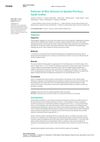 December 2023 in “Tuberkuloz ve Toraks/Tüberküloz ve toraks”
December 2023 in “Tuberkuloz ve Toraks/Tüberküloz ve toraks” Many COVID-19 patients have long-term symptoms, especially women, but certain medications may help reduce these symptoms.
 December 2023 in “Journal of health and rehabilitation research”
December 2023 in “Journal of health and rehabilitation research” Oral Apremilast effectively treats alopecia areata in most patients.
 December 2023 in “Dermatology and therapy”
December 2023 in “Dermatology and therapy” Japanese patients and physicians often disagree on the severity of Alopecia Areata and treatment satisfaction, needing better communication and treatments.
[object Object]  December 2023 in “Curēus”
December 2023 in “Curēus” Acne is the most common skin issue in Qassim Province, especially among young adults.
 December 2023 in “Y Dược học”
December 2023 in “Y Dược học” Older adults in Vietnam often experience hair loss after COVID-19, especially women, singles, and those hospitalized.
 December 2023 in “Asian journal of medical sciences”
December 2023 in “Asian journal of medical sciences” Psoriasis is the most common cause of erythroderma, and proper medical follow-up is crucial.

Alopecia areata patients have higher levels of certain immune receptors, suggesting new treatment possibilities.
 November 2023 in “International Journal of Advanced Research in Science, Communication and Technology”
November 2023 in “International Journal of Advanced Research in Science, Communication and Technology” The herbal hair oil was more effective at reducing hair fall than coconut oil.
 November 2023 in “Curēus”
November 2023 in “Curēus” Eating junk food is linked to higher rates of PCOS and related symptoms in women.
 September 2023 in “Scientific reports”
September 2023 in “Scientific reports” Segmental hair analysis can track testosterone over time but needs adjustments for sex, hair color, and washing frequency.
 September 2023 in “Research Square (Research Square)”
September 2023 in “Research Square (Research Square)” Evening primrose oil significantly improves hormone levels and reduces BMI and cholesterol in women with PCOS.
 August 2023 in “bioRxiv (Cold Spring Harbor Laboratory)”
August 2023 in “bioRxiv (Cold Spring Harbor Laboratory)” Too much β-catenin activity can mess up the development of mammary glands and make them more like hair follicles.
 August 2023 in “International journal of research in dermatology”
August 2023 in “International journal of research in dermatology” Janus kinase inhibitors are effective and generally safe for treating hair loss in adults with alopecia areata.
 August 2023 in “Research Square (Research Square)”
August 2023 in “Research Square (Research Square)” Two microRNAs affect hair follicle development in sheep by targeting specific genes.
 July 2023 in “Dermatology and therapy”
July 2023 in “Dermatology and therapy” People with alopecia areata may have a higher risk of blood clots.
[object Object]  July 2023 in “bioRxiv (Cold Spring Harbor Laboratory)”
July 2023 in “bioRxiv (Cold Spring Harbor Laboratory)” The mesenchyme can start hair growth, but the exact signal that causes this is still unknown.
 June 2023 in “Research Square (Research Square)”
June 2023 in “Research Square (Research Square)” Hyaluronic acid and polycaprolactone improve skin regeneration, with polycaprolactone having a stronger effect on healing and tissue repair.
 June 2023 in “Dermatology and therapy”
June 2023 in “Dermatology and therapy” Doctors in the Middle East need better treatments and more knowledge about new therapies for hair loss condition Alopecia Areata.
 February 2023 in “Journal of clinical medicine research”
February 2023 in “Journal of clinical medicine research” Zinc acetate hydrate may help reduce fatigue and hair loss in post-COVID-19 patients.
 January 2023 in “Open Life Sciences”
January 2023 in “Open Life Sciences” VEGFR-2 activation is likely involved in hair follicle growth, survival, and development.
 January 2023 in “Revista Paulista de Pediatria”
January 2023 in “Revista Paulista de Pediatria” A Brazilian male with IFAP syndrome has a unique genetic variant causing his condition.
 December 2022 in “bioRxiv (Cold Spring Harbor Laboratory)”
December 2022 in “bioRxiv (Cold Spring Harbor Laboratory)” MicroRNA-205 helps hair grow by changing the stiffness and contraction of hair follicle cells.
 November 2022 in “Research Square (Research Square)”
November 2022 in “Research Square (Research Square)” The research provides insights into hair follicle growth in forest musk deer by identifying key genes and pathways involved.
 November 2022 in “bioRxiv (Cold Spring Harbor Laboratory)”
November 2022 in “bioRxiv (Cold Spring Harbor Laboratory)” MOF controls skin development by regulating genes for mitochondria and cilia.
 October 2022 in “Dermatology practical & conceptual”
October 2022 in “Dermatology practical & conceptual” People with hidradenitis suppurativa are more likely to have bipolar disorder than those with psoriasis or without skin conditions.
 August 2022 in “International Journal of Health Sciences (IJHS) (En línea)”
August 2022 in “International Journal of Health Sciences (IJHS) (En línea)” Oxidative stress is important in causing alopecia areata.
 July 2022 in “Research Square (Research Square)”
July 2022 in “Research Square (Research Square)” Hair analysis can somewhat track past testosterone levels but is influenced by factors like hair washing, growth rate, sex, and hair color.
 July 2022 in “International Journal of Health Sciences (IJHS) (En línea)”
July 2022 in “International Journal of Health Sciences (IJHS) (En línea)” Men with Type 2 Diabetes have lower DHT levels, which may affect fertility and lipid profiles.
 July 2022 in “Research Square (Research Square)”
July 2022 in “Research Square (Research Square)” Certain miRNAs may play a role in sheep hair follicle development, which could help improve wool production.
 June 2022 in “Biomedical reports”
June 2022 in “Biomedical reports” STK11 gene variations do not predict how well metformin will work for PCOS, but may affect hair loss and excess hair growth.






























